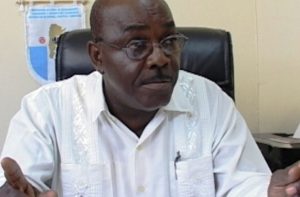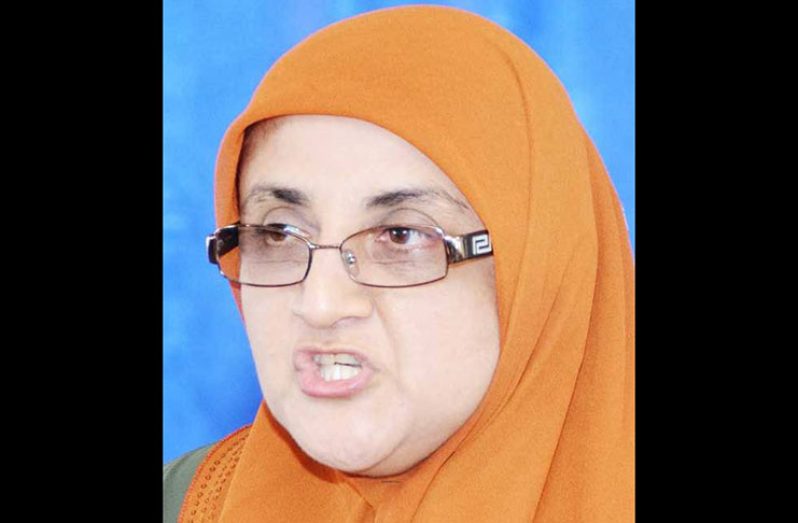THE Chambers of the Director of Public Prosecutions (DPP) is under scrutiny for its lack of State prosecutors, following the recently-concluded larceny trial of former Public Service Commission Chairman Carvil Duncan.Duncan, a former Guyana Power and Light (GPL) Board member, was freed of a larceny charge last week. The State lost its case against Duncan, who was before the courts on an alleged theft of $1M from the power company. A lack of proper prosecution was cited as a key element in Duncan’s acquittal, and the presiding magistrate criticised the work of the police prosecutor, deeming it sloppy.
Magistrate Leron Daly, after upholding a no-case submission by Duncan’s former attorney, Charles Ramson Jr, and present Attorney Glenn Hanoman, ruled that there was not sufficient evidence to convict Duncan of the offence.
He, however, still faces a conspiracy to steal charge, and was instructed to return to court on January 4, 2017, in relation to a charge in which he is accused of conspiring with another to steal $27,757,547 from the GPL between May 7 and 8, 2015.
It was reported that Duncan and a former senior GPL official, Aeshwar Deonarine, were part of a multi-million-dollar fraud at GPL. The men are alleged to have illegally transferred close to $28M from GPL to their personal bank accounts.
The DPP is the nation’s premier prosecuting arm. However, in several recent high profile cases before the courts, its role has been questioned. The DPP took roughly one year before it assigned State prosecutors to handle the case of multiple fraud charges against former Public Service Minister Dr. Jennifer Westford and another senior officer of the Public Service Ministry.
In a statement issued on Friday, the DPP denied that State prosecutors had expressed reluctance to take on sensitive political cases being pursued by the current administration, although a top government official is insisting that they did.
That official also said that the DPP chambers took almost one year after the Westford case started to assign State prosecutors to handle it. Prosecutors were assigned to the case, according to sources, only after Government had signalled its intention to employ special prosecutors.

Political activist and Executive member of the Working People’s Alliance, Tacuma Ogunseye, in a letter appearing in the Stabroek News, stated that the Duncan case raises a lot of questions.
NOT COMPETENT ENOUGH
Ogunseye said the dismissal of the case on ground of insufficient evidence calls into question the seriousness of the State in bringing to justice alleged wrongdoers of the former regime. He asked why a senior counsel was not assigned to prosecute the case. He raised his query along the lines that the prosecutor would not have been competently capable of prosecuting the case against the country’s leading lawyers.
He said, “Reading the magistrate’s legal justification for throwing out the case, the poorly prepared case of the prosecution was highlighted. Some of the shortcomings are elementary matters; for example, the presentation of photocopied documents without any attempt being made to prove that an original existed and that the copy was a true representation of the original.”
He said the prosecution also led no circumstantial evidence in relation to the bank statement showing that a sum had been debited from GPL’s account, so the court could only admit that it existed, not the truth of it.
Attorney General and Minister of Legal Affairs, Basil Williams, on Thursday told this newspaper that Government was forced into hiring special prosecutors for the Pradoville 2 and the Guyana Cricket World Cup Inc. scams owing to the fact that state prosecutors had expressed discomfort in standing in those cases.
“We were forced into that position because the Director of Public Prosecutions (DPP) had indicated that the members of her department had some discomfort in having to prosecute the case of a former minister (Jennifer Westford) and as a result of that… If the State’s prosecution department is saying that they don’t wish to prosecute these types of matters that are political, what was the State supposed to do; fiddle with its hands?” Williams asked.
FAIR PROSECUTIONS
However, the DPP, in a missive responding to an article in this newspaper, on Friday stated that her office is governed by Article 187 of the Constitution of Guyana, and added that prosecutions will continue to be done fairly and impartially, based solely on consideration of the evidence contained in the police file and the prevailing law.
“Specifically, as it relates to the court matter involving former minister Jennifer Westford, the DPP herein informs that two lawyers from the DPP’s Chambers, Senior State Counsel Teshana Lake and State Counsel Natasha Backer, are prosecuting this matter. Observers say both counsels have little experience in prosecuting high-profile cases.”
Further, the DPP said neither of these two state lawyers has expressed any discomfort in discharging their duties in the said matter.
“The DPP, Mrs. (Shalimar) Ali-Hack, or any other lawyer in these Chambers, has never indicated that they are uncomfortable in prosecuting any criminal matters, whether political or otherwise. The staff at the DPP’s Chambers examine the evidence in police files in relation to the prevailing law, and advise charges accordingly; prosecutions are based on the evidence in the file and the law. This is so regardless of who the accused persons are and the positions they hold,” the DPP stated.
Additionally, the DPP said the present system is that lawyers at these Chambers appear in the High Court and all the Appellate Courts. “There are not sufficient lawyers to appear in the Magistrates’ Courts; hence four police prosecutors are assigned to these Chambers, and appear in the more serious cases in the Magistrates’ Courts. To say that State Prosecutors shun highly political cases is defamatory,” the statement added.




.jpg)









